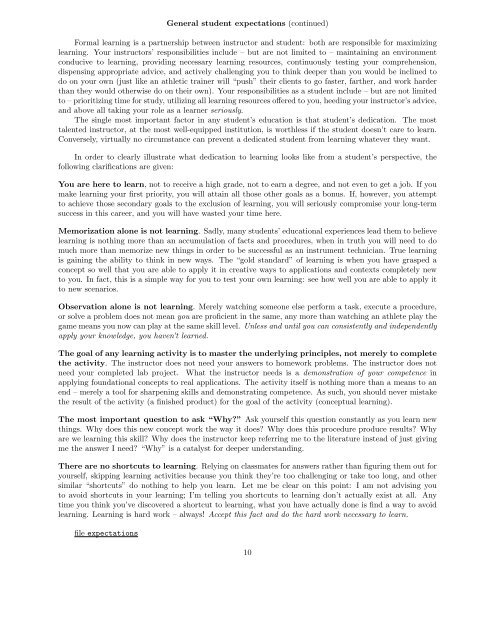INST 262 (DCS and Fieldbus), section 2 Lab Automatically ...
INST 262 (DCS and Fieldbus), section 2 Lab Automatically ...
INST 262 (DCS and Fieldbus), section 2 Lab Automatically ...
You also want an ePaper? Increase the reach of your titles
YUMPU automatically turns print PDFs into web optimized ePapers that Google loves.
General student expectations (continued)<br />
Formal learning is a partnership between instructor <strong>and</strong> student: both are responsible for maximizing<br />
learning. Your instructors’ responsibilities include – but are not limited to – maintaining an environment<br />
conducive to learning, providing necessary learning resources, continuously testing your comprehension,<br />
dispensing appropriate advice, <strong>and</strong> actively challenging you to think deeper than you would be inclined to<br />
do on your own (just like an athletic trainer will “push” their clients to go faster, farther, <strong>and</strong> work harder<br />
than they would otherwise do on their own). Your responsibilities as a student include – but are not limited<br />
to – prioritizing time for study, utilizing all learning resources offered to you, heeding your instructor’s advice,<br />
<strong>and</strong> above all taking your role as a learner seriously.<br />
The single most important factor in any student’s education is that student’s dedication. The most<br />
talented instructor, at the most well-equipped institution, is worthless if the student doesn’t care to learn.<br />
Conversely, virtually no circumstance can prevent a dedicated student from learning whatever they want.<br />
In order to clearly illustrate what dedication to learning looks like from a student’s perspective, the<br />
following clarifications are given:<br />
You are here to learn, not to receive a high grade, not to earn a degree, <strong>and</strong> not even to get a job. If you<br />
make learning your first priority, you will attain all those other goals as a bonus. If, however, you attempt<br />
to achieve those secondary goals to the exclusion of learning, you will seriously compromise your long-term<br />
success in this career, <strong>and</strong> you will have wasted your time here.<br />
Memorization alone is not learning. Sadly, many students’ educational experiences lead them to believe<br />
learning is nothing more than an accumulation of facts <strong>and</strong> procedures, when in truth you will need to do<br />
much more than memorize new things in order to be successful as an instrument technician. True learning<br />
is gaining the ability to think in new ways. The “gold st<strong>and</strong>ard” of learning is when you have grasped a<br />
concept so well that you are able to apply it in creative ways to applications <strong>and</strong> contexts completely new<br />
to you. In fact, this is a simple way for you to test your own learning: see how well you are able to apply it<br />
to new scenarios.<br />
Observation alone is not learning. Merely watching someone else perform a task, execute a procedure,<br />
or solve a problem does not mean you are proficient in the same, any more than watching an athlete play the<br />
game means you now can play at the same skill level. Unless <strong>and</strong> until you can consistently <strong>and</strong> independently<br />
apply your knowledge, you haven’t learned.<br />
The goal of any learning activity is to master the underlying principles, not merely to complete<br />
the activity. The instructor does not need your answers to homework problems. The instructor does not<br />
need your completed lab project. What the instructor needs is a demonstration of your competence in<br />
applying foundational concepts to real applications. The activity itself is nothing more than a means to an<br />
end – merely a tool for sharpening skills <strong>and</strong> demonstrating competence. As such, you should never mistake<br />
the result of the activity (a finished product) for the goal of the activity (conceptual learning).<br />
The most important question to ask “Why?” Ask yourself this question constantly as you learn new<br />
things. Why does this new concept work the way it does? Why does this procedure produce results? Why<br />
are we learning this skill? Why does the instructor keep referring me to the literature instead of just giving<br />
me the answer I need? “Why” is a catalyst for deeper underst<strong>and</strong>ing.<br />
There are no shortcuts to learning. Relying on classmates for answers rather than figuring them out for<br />
yourself, skipping learning activities because you think they’re too challenging or take too long, <strong>and</strong> other<br />
similar “shortcuts” do nothing to help you learn. Let me be clear on this point: I am not advising you<br />
to avoid shortcuts in your learning; I’m telling you shortcuts to learning don’t actually exist at all. Any<br />
time you think you’ve discovered a shortcut to learning, what you have actually done is find a way to avoid<br />
learning. Learning is hard work – always! Accept this fact <strong>and</strong> do the hard work necessary to learn.<br />
file expectations<br />
10


